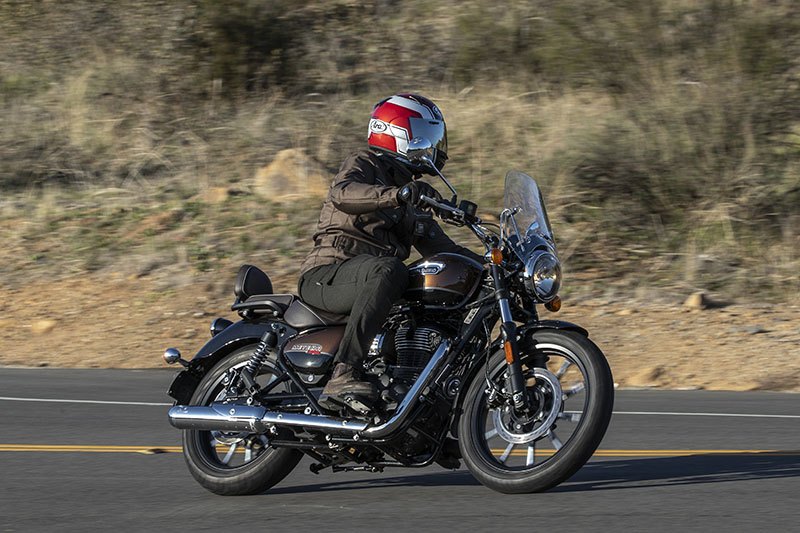
These days small-displacement motorcycles all too often get classified as starter bikes, which is a shame. While light, economical, approachable motorcycles are certainly a better choice for new riders than heavy, expensive, intimidating ones, smaller bikes also have a lot to offer experienced riders. Things like simplicity and purity. By stripping away a lot of nice-to-have but not need-to-have features, what you’re left with is the essence of riding.
And let’s not forget, Robert M. Pirsig, as recounted in his book “Zen and the Art of Motorcycle Maintenance,” rode from Minnesota to California on a 305cc Honda CB77 Super Hawk, with his son Chris on the back and laden with camping gear. They didn’t get there fast, but then again, it was more about the journey than the destination.
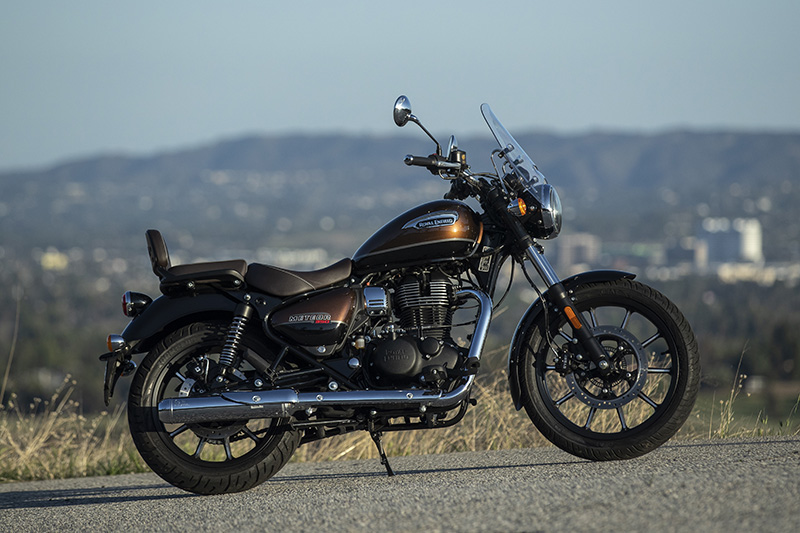
Royal Enfield, which celebrates 120 years of continuous operation this year, specializes in small to midsize motorcycles. For years it was best known for its classically styled Bullet, powered by a 500cc single. RE’s Himalayan is a 411cc, single-cylinder adventure bike, and its Continental GT and INT 650 are powered by a 648cc parallel-twin. All of the engines are air-cooled, designed for rugged dependability rather than outright performance.

For 2021, the Royal Enfield family gets a new addition — the Meteor 350, a light, affordable cruiser that takes its name from ’50s- and ’60s-era models like the Meteor Minor and Super Meteor. Available in three budget-friendly trim packages, variants include the base-model Fireball ($4,399) with a black exhaust system; the Stellar ($4,499), with a chrome exhaust and a passenger backrest; and the Supernova ($4,599), which adds a windshield and a two-tone paint scheme. Our Supernova test bike also had accessory wide footrests installed ($91.95).
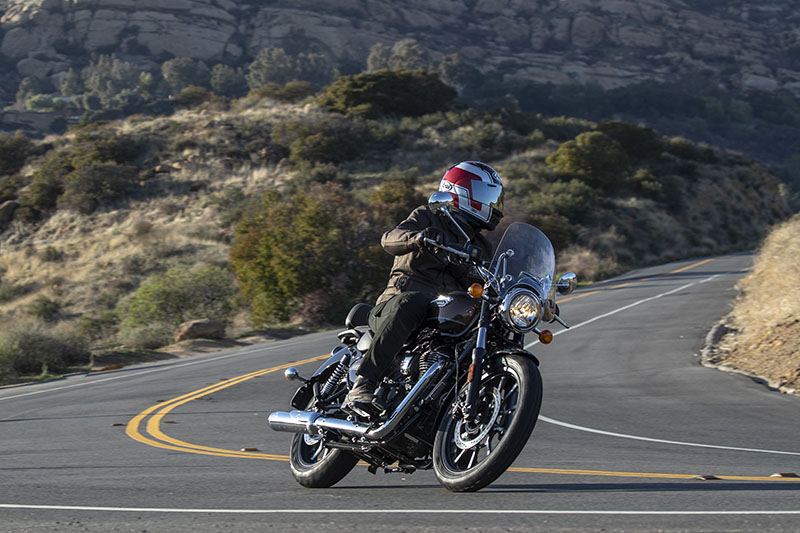
Affordable motorcycles may be cheap in terms of price, but they needn’t be cheap in terms of features or style. Co-developed at Royal Enfield’s technical centers in Bruntingthorpe, England, and Chennai, India, the Meteor 350 strikes a balance between the brand’s British and Indian heritages. All of the models have standard two-channel ABS, cast-aluminum wheels with tubeless tires, a centerstand, a USB charging port and the innovative Tripper navigation system, which pairs with a smartphone app and shows turn-by-turn directions on a dedicated screen next to the large analog/digital instrument cluster. Like all Royal Enfields, they’re backed by a three-year, unlimited-mileage warranty with roadside assistance, and built in a state-of-the-art, ISO-9001-certified manufacturing facility in Chennai.
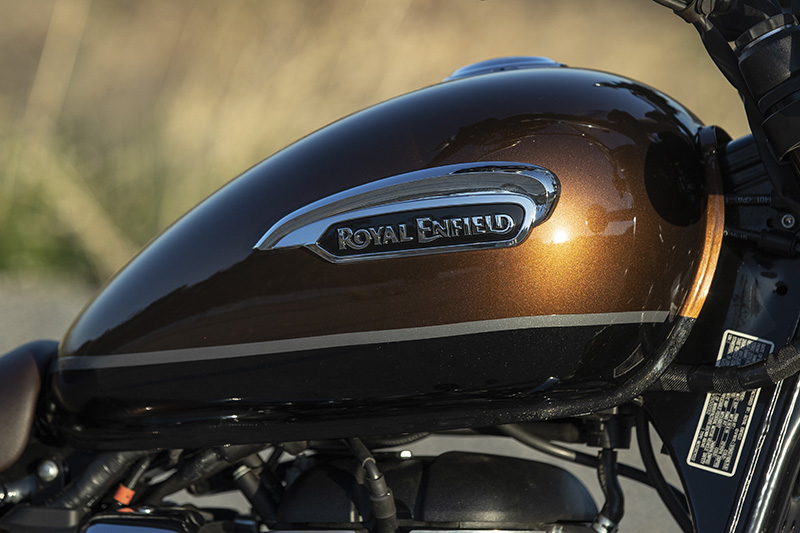
Our test unit was painted a rich, sparkling Supernova Brown with a black undertone. The teardrop tank, the black engine with machined fins and the high-gloss chrome badging, exhaust, mirrors and headlight bezel are classic and authentic, while the black alloy wheels with machined edges add a modern touch. Other than some unsightly wires and cables near the headstock, RE’s design departments have outdone themselves.
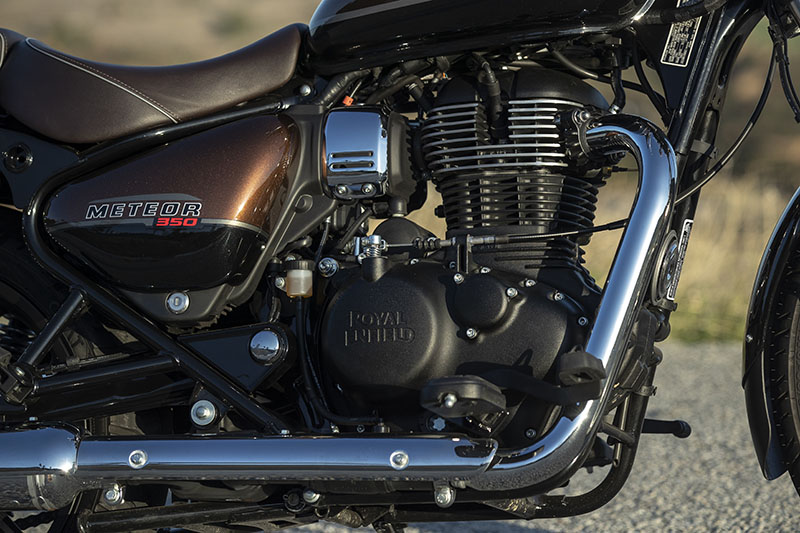
Powering the Meteor’s flight is an all-new air-cooled 349cc single with SOHC actuating two valves, an engine that’s as welcoming as can be. On Jett Tuning’s dyno it chugged out 18 horsepower at 6,200 rpm and 18 lb-ft of torque at 3,500 pm, with redline just past 6,500 rpm (there’s no tachometer on the bike). Those are modest figures by just about any measure, but modesty is one of the Meteor’s greatest virtues. At idle the single putts at such low rpm it feels like the bike wants to quit, yet the slightest bit of throttle brings out its distinctive “thump.” Sit back, relax and enjoy the ride.
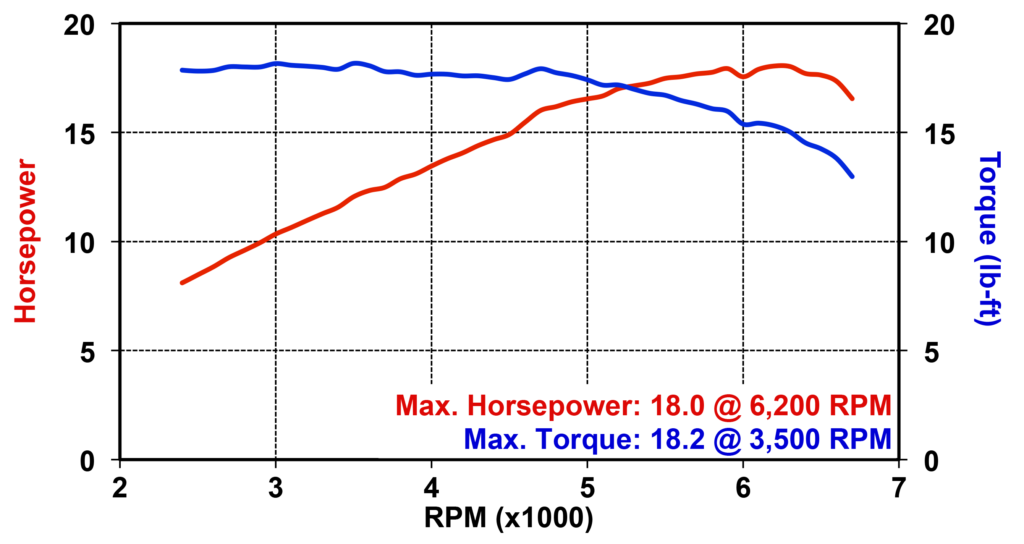
A throaty burble emerges from the chrome exhaust, never offensive, and the engine’s response is best described as polite. The thumper creates a mellow soundtrack while spooling up confidently and predictably. A balancer shaft keeps the whole operation smooth, from low to high rpm, while still allowing enough rumble to let you know whatcha got. A touch of low-end torque, a bit of midrange grunt and you’re zipping around with a smile on your face in no time flat.
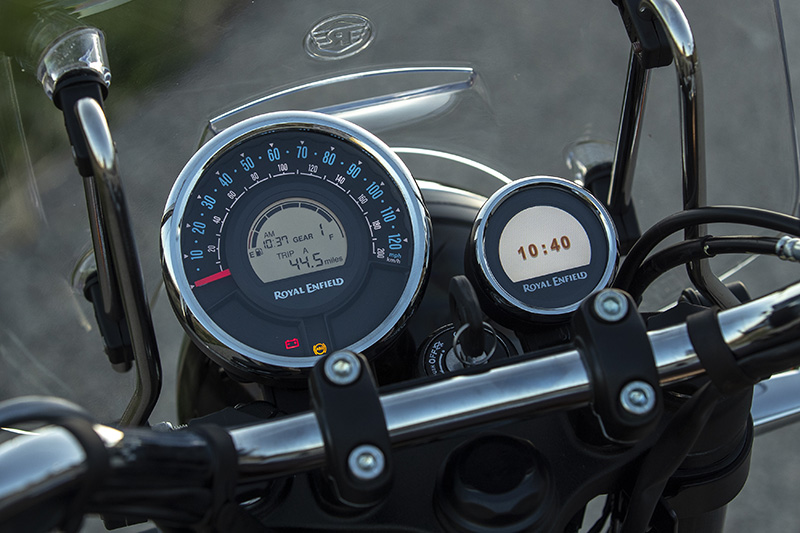
The Meteor’s analog speedometer, which goes up to 120 mph, is a touch ambitious. Even on a steady downhill, 75 mph was the most I could muster, and it took a little while to get there. That’s okay. Wringing its neck on hurry-up-and-get-there freeways isn’t what this bike is about. What the Meteor lacks in top speed it makes up for in fuel economy. We averaged 67 mpg, which gets you 267 miles of range out of the 4-gallon tank.
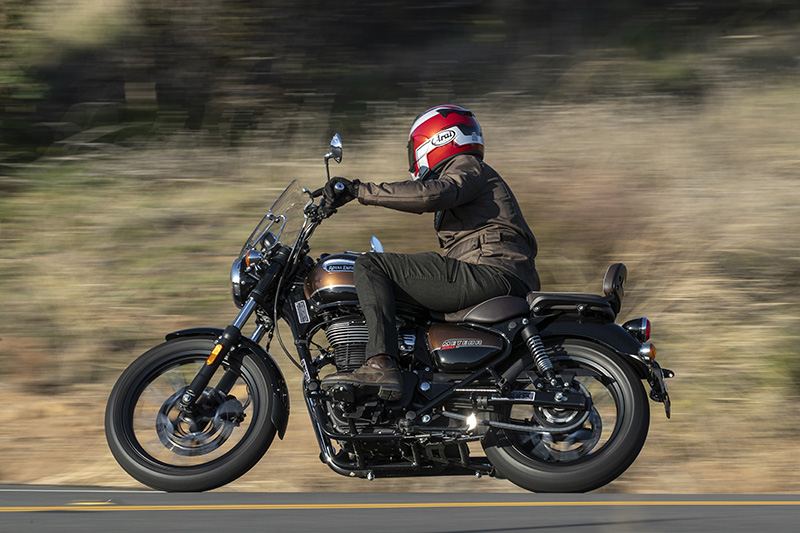
Nic’s Gear:
Helmet: Arai Regent-X
Jacket: Spidi Originals Enduro
Gloves: Spidi Clubber
Pants: Spidi Pathfinder Cargo
Boots: TCX X-Blend WP
The 5-speed gearbox has a light shift throw but can be notchy when tossed into first gear. The accessory wide footrests made shifting a little awkward, but standard equipment includes a heel-toe shifter, a nice nod to American heavyweight cruisers. The clutch pull is a tad heavy, but engagement is good and everything works together well.
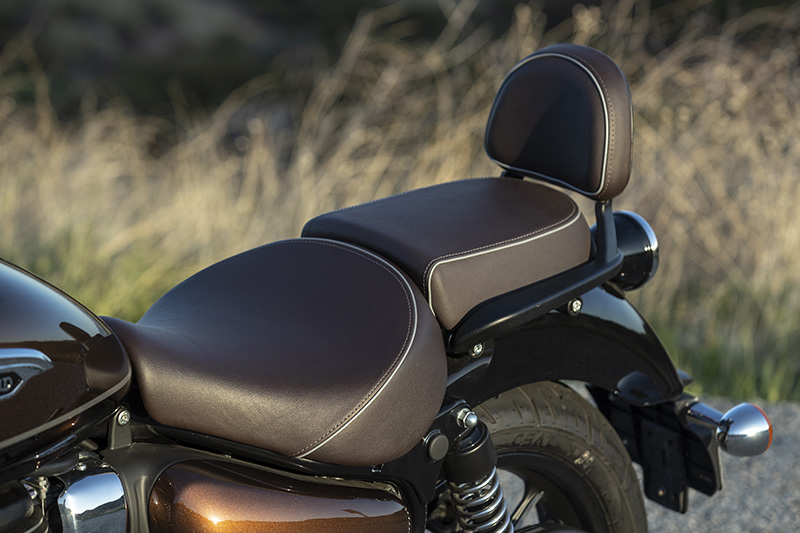
Regardless of experience, riders come in all shapes and sizes. The Meteor 350 is one of those bikes that will inspire confidence in a wide range of folks. The wide saddle is comfortable and perched at a middle-of-the-road height of 30.1 inches — not crazy low like some cruisers, but not unnecessarily high like some standards. Midmount controls and pullback handlebars are perfectly positioned and allow for an upright posture with no pain points. Even our 6-foot-tall EIC and his 34-inch inseam felt right at home, and the bike didn’t feel diminutive.
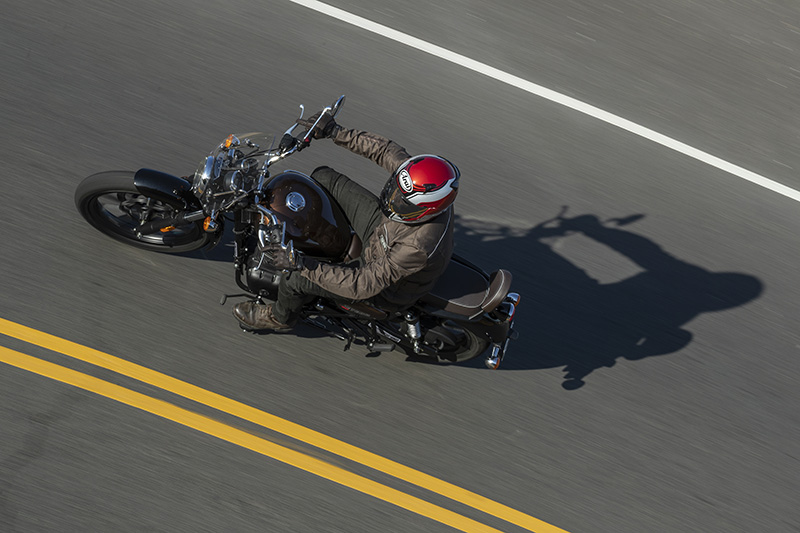
Modest proportions, including a 55.1-inch wheelbase, a 423-pound curb weight (as tested; load capacity is 404 pounds!) and a low center of gravity, contribute to the Meteor’s neutral handling. It maneuvers gently with little input, tipping into turns predictably, letting any rider get their bearings. The 19-inch front and 17-inch rear wheels fit the cruiser theme and don’t impede steering response. At speed, the bike feels plenty stable, thanks in part to its stout double-cradle steel frame, and the windshield parts airflow smoothly.
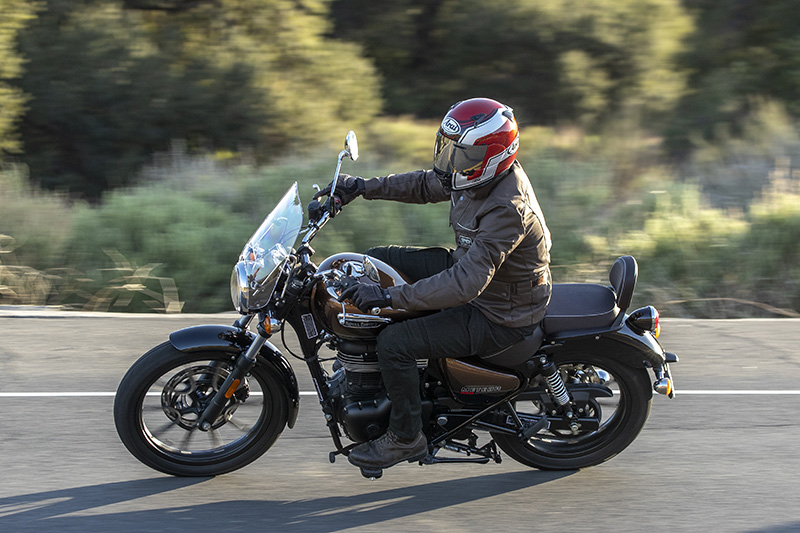
A well-tuned 41mm fork and dual emulsion shocks, the latter with six step adjustable preload, do a solid job of muting road irregularities without transferring much to the rider. Cornering clearance is better than average for a cruiser, but I suspect most Meteor owners will log plenty of miles with nary a scratch on the peg feelers. The Meteor’s brakes get the job done, but are not particularly strong. Up front, a 2-piston Bybre floating caliper squeezes a 300mm disc, and bringing up the rear is 1-piston floating caliper squeezing a 270mm disc, with ABS adding a valuable safety net. Using both front and rear brakes together is recommended to get full stopping power, with firm pressure on both lever and pedal. Mellow initial bite will be a boon for new riders.
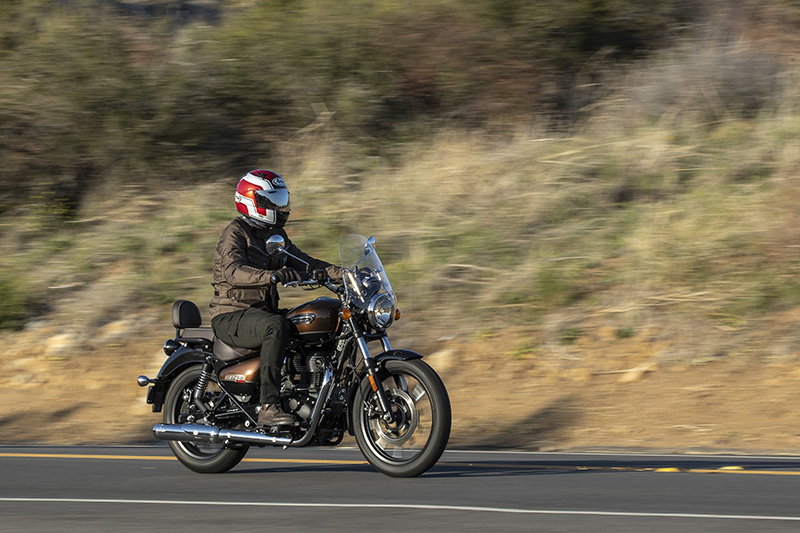
Royal Enfield’s Meteor 350 has the kind of welcoming, carefree attitude that is sure to leave an impression, thanks to its gentle handling, approachable power and good looks. We’d like a higher top speed (or to just get there sooner) and the Meteor is heavier than other small-displacement cruisers in this class (like the Honda Rebel 300 and Yamaha V Star 250), but the bike feels solid and offers good value. Whether you want to add another motorcycle to the stable, or you’re a new rider looking for a comfortable, user-friendly motorcycle on which to hone your skills, this bike will leave stars in your eyes.
2021 Royal Enfield Meteor 350 Specs
Base Price: $4,399
Price As Tested: $4,691 (Supernova trim, $4,599; accessory wide footrests, $91.95)
Warranty: 3 yrs., unltd. miles w/ roadside assistance
Website: royalenfield.com
Engine Type: Air-cooled single, SOHC w/ 2 valves
Horsepower: 18 @ 6,200 rpm (rear-wheel dyno)
Torque: 18 lb-ft @ 3,500 rpm (rear-wheel dyno)
Displacement: 349cc
Bore x Stroke: 72.0 x 85.8mm
Transmission: 5-speed, cable-actuated wet clutch
Final Drive: O-ring chain
Wheelbase: 55.1 in.
Rake/Trail: 26.7 degrees/4.3 in.
Seat Height: 30.1 in.
Wet Weight: 423 lbs. (as tested)
Fuel Capacity: 4.0 gals.
Fuel Consumption: 67 mpg
Estimated Range: 267 miles

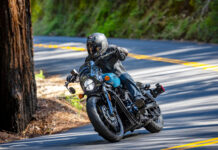






I’m all for light bikes but this thing weighs as much as an MT-09. It looks great but for reliability at that price I’d also look at the CB-500F or the Z400.
Yes that’s pretty heavy for a 350, needs to lose about 60 lbs. Great looking bike, love the classic British styling, if there was a RE dealer close I’d take a look at one. The Fireball in red is really appealing to me.
Cool bike, nice price but 18hp at 430 pounds? My DR350 has 25 and weighs 100lbs less.
I am watching this new bike with interest. If long term reviews are good, I could see buying one within the next couple of years.
Pirsig’s CB77 had about 25 horsepower — Honda claimed 27 or 28 — and weighed around 350 pounds, topping out at 90 mph or more (having owned four over the years). Still, modern tires, wheels, and brakes are not to be discounted and it looks comfortable, as singles go. The cafe version can’t be far behind.
This is a great looking motorcycle with a comfortable looking seat. It’s nice to have a 4 gallon gas tank so you don’t have to start or end your ride at a gas station every time and the cast wheels are also a nice touch. I would like to have a demo ride just out of curiosity and concern that I could stay in front of traffic. One thing that’s nearly always left out is how frequent are the valve adjustments? Usually the valve adjustments are very frequent for Royal Enfield motorcycles which could be expensive and take away from any savings on the initial price. I really love the looks though!
Glenn,
As a Meteor 350 owner, I can tell you about the valve adjustments. One, they’re EASY! If you have a decent set of tools, you can do ’em yourself; RE uses a screw & locknut system, not the shim & bucket that Jap bikes use. With the shim & bucket, you’ll have to remove the cams to change different sized shims, whereas with the screw & locknut, you don’t. Two, there are only two valves. Three, the initial check is at 500 km or 310 miles; each successive check is at 10,000 km, 6,200 miles, or 12 months.
Mark, thanks so much for the info regarding the valve adjustments. It looks like the valve adjustments need to be done pretty often. However, I like the bike styling and comfort it offers so much that I am really temped to have one. I live in Canada and here they are also pricey. If I could adjust the valves myself it would be a game changer. Would you be able to provide me with some material, instructions on how to adjust the valves? Thank you.
Hi !! I just came back yesterday evening after completing a 575km ride in 2 days in Northern Himalayan part of India. It was mix of plain , uphill and little bit of off-road and for me who is a first time rider riding Meteor was like fun with full confidence of not crashing. Initial acceleration is like awesome and if you can shift to 3rd gear timely then it feels like you are in a 600cc above super bike.
In terms of comfort the riders upright position makes it possible to ride 600-700 kms non stop in plains.
I did 287 km non stop in 7.21 hrs including city crossing traffic and jams and crossed maximum elevation of 2692 m with total elevation gain of 3253 m. Max. Speed was like 104km/hr and avg speed was 45 km/hr. Only one break was taken for 5 mins for fuel refilling.
Most enjoyable part is turning with confidence when you lean more than 50 degrees approximately.
Maximum speed I have touched on plains is 120 km/hr which I feel is enough for this kind of weight and stability for bike. My average speed was 90 km/hr for a ride of 240 km.
Overall my decision of buying Meteor over Interceptor 650 after well thought research and analysis is well paid off in terms of confidence, comfortable, safety and styling. For power I will say not required more than this if you are not doing serious off road and very long distance rides where time is a factor to complete the ride.
Thanks
Just the kind of review I was looking for.
Well documented :-))
I think this was an excellent review – I have ordered a Fireball in yellow. I will just mention though that my main reason for purchasing was the Meteors low seat height, which wasn’t covered in the review. The seat height is 765mm and as I am only 5’2” with an inside leg of 27”, I need something I can manage easily. There is also the option to buy a “low rider” seat which can lower the bike even further by 11-20mm (which I’ve already bought in preparation!) and with the option to adjust the rear shocks slightly, it will make the bike perfect for shorter riders like myself. If the top speed and 0-60mph is an issue then you shouldn’t really be looking at this kind of bike anyway!
I agree. I’ve watched numerous videos and road tests and by far this is the best review.
Ordered mine in Yellow. Looking forward to it. my big Honda was becoming too heavy for me to back into garage at 70 sadly.
At 74, know just what you mean. Age & arthritis have led to ever smaller/lighter bikes. From VTX1300 in several stages to my current Rebel 500. Really fancy the looks of Meteor, and am arranging for a demo run with local dealer.
In the 1960s in UK a neighbor of mine had a Meteor Minor with a sidecar, I always liked the look of that Meteor. I had a Triumph T110 at the time. Its a shame that this new one only has one pot, and a very low BHP.
[…] CLICK HERE to read Powersports Business sibling publication Rider Magazine’s full review of the new machine, including specs, photos and expert opinion after testing. […]
I know its not about speed, but I think it has less power than a 1956 350 Bullet. and certainly less than an original meteor.
That 120 mph speedometer sticks out like a sore thumb. However, out here in India it is marked upto 99mph (160kmph) which seems apt. You guys can swap your speedometer with the Indian ones. It feels restricted out on the open roads but is relaxing to ride around in the town. I hope it had a smidge more go.
I’ve just bought a supernova and I am well pleased with itI live in the New Forest in Hampshire, and mostly I’ll just be bumbling about locally. My previous bike is a 350 Bullet, interestingly I think It has about 20bhp with an aftermarket silencer and air filter. I have got it up to an indicated 70mph on a long downhill, but it felt as if it was going to explode!
So 70 years haven’t brought much more performance, just far more comfort and sophistication.
It’s a shame because in the early 70s 250 2 stroke Jap bikes would push a ton. Where as Honda stuck with 4 strokes and the 250 Super Dream would do 84mph.
My 125 Yam will reach 70mph, so I was hoping the Enfield 350 would do 80+mph. My commute involves motorways and I wanted to leave the car at home and occasionally take the bike. I like the mag wheels on the 350, and the classic look.
My 1968 HD Aermacchi 125 Rapido would do over 70 mph. This thing seems pretty slow for a bike in 2022!
While horsepower is relevant for top speed, it is torque you experience around town. Most of the 20 ft-lbs torque is available at 2k rpm, which provides its good acceleration below top speeds. That also relieves you from needing to shift so often, since it can lug at lower rpms. I guess it’s all about what kind of riding style you like. That said, I haven’t owned a bike since 1970, when I had a 1969 Yamaha Enduro (DT1) which I bought new in 1969, and immediately drove it 200 mi from Roswell to Las Cruces NM. But now, at 73, I’m seriously considering a Meteor 350 Fireball in Red. It would be used on the back roads to enjoy the great New Mexico outdoors.
I’m 73. I bought the Meteor 350 a couple of months ago here in El Paso. It’s a heavy bike, believe me. I’m still figuring out how I’m going to get it on the center stand to clean/lube the chain.
The acceleration is good in low gears. It is not a luggard. You can feel it. I haven’t gotten it up to speed yet, as it just passed the initial break-in mileage (300 miles). The gas gauge is weird. It has a couple of precaution settings built in, because they don’t want you to ride on an almost-empty tank, which would mess up the fuel pump.
The first week I had it, one of the pumps (I think the fuel pump) started making a whining noise, and after taking it in more than once, I convinced the agency to fix it. They did. The rear brake started whining then, which has happened to me twice before on two new bikes, and they fixed that after I brought it in a couple of times also.
The first maintenance is about $340 at 300 miles. Steep but not crazy steep. It’s currently in the shop for that.
The seat hurts me after an hour, but then I really do have a skinny butt. I’m hoping to cruise it to Austin or Dallas at some point, or Laredo. Shifting is fine, as long as you wait until you’re going really slow to download it to first.
It’s a big bike for me, at age 73. I’m hoping it will last a long time, or at least the 3 years of its warranty.
Many people talk about the poor top speed of this bike. I personally believe that the world is full of motorcycles that offer high speeds, even with low powers and more contained weights. And there are also a lot of people who don’t like speed, for whatever reasons, but who enjoy the pleasure of riding a robust and reliable motorcycle, simple but complete, and with significant torque at very low rpm, which is what we really perceive of the engine’s power. And that bike is the Meteor, a machine made for us, like the ones we used to ride many decades ago but with a technological refinement that we could not have dreamed of then. Those of us who are approaching certain ages but do not give up as long as desire can, we are a good part of that lot, say the target probably and it grows fast, Then there are those who start, those who no longer find what they want on a scooter. the middle-aged people who started sharing cars with the scooter and the maxi… I have the impression that it is going to be a serious commercial success, a tribute to the mythical and pioneering British motorcycles, brought to the 21st century with the homework done.
I also assume that it is not a motorcycle for everyone, but that is what the offer is for.
I bought a Matte Black Stellar a few months ago that has changed my life. I am 68 and since the purchase, apart from using it and keeping it in magazine condition, I carry out a specific exercise plan to delay the degenerative effects as much as possible. My personal trainer’s name is Meteor.
I like hearing from you old guys, as I will turn 74 shortly. I am looking at the Meteor Fireball. I’ve only had one motorcycle before, at age 21, and it was Yamaha 250 Enduro (DT1) that I bought new. When I sat on the Meteor at the dealer, it did feel very heavy to me, but then the DT1 weighed only 231 lbs dry, probably about 250 or 255 wet, so more than 160 lb lighter than the Meteor. But as a 2-stroke it sounded ugly and ran very dirty by today’s standards. At my age, the relaxed foot forward pegs and heel-toe shifter and good low end torque and great looks are important to me. My plan is to avoid freeways and go on short day tours and knock about town (Albuquerque NM). Tnx for all your impressions about this bike.
I have over 5,000 miles on my Meteor. Average 80 miles to the gallon, mostly mountain riding.
No issues so far. The most comfortable motorcycle I have ever ridden. 200 miles a day is no problem, and I’m 72. The top speed is 75 miles an hour and it’s limited to that. I would like a bit more horsepower and torque for the size of the engine and weight, but all in all, I really like it. I put handle bar risers on, with a little adjustments of the cables, and makes a lot of difference in position and handling. Also put crash bars as I sometimes drop it at a stop due to the weight and uneven ground. Great bike if you don’t have a need for speed.